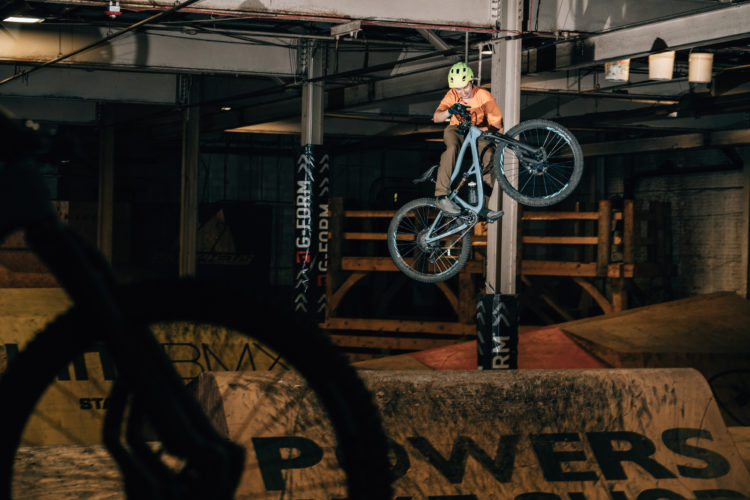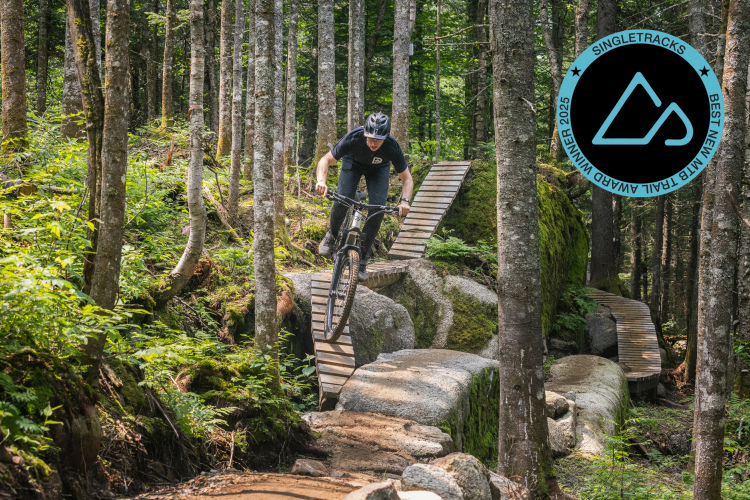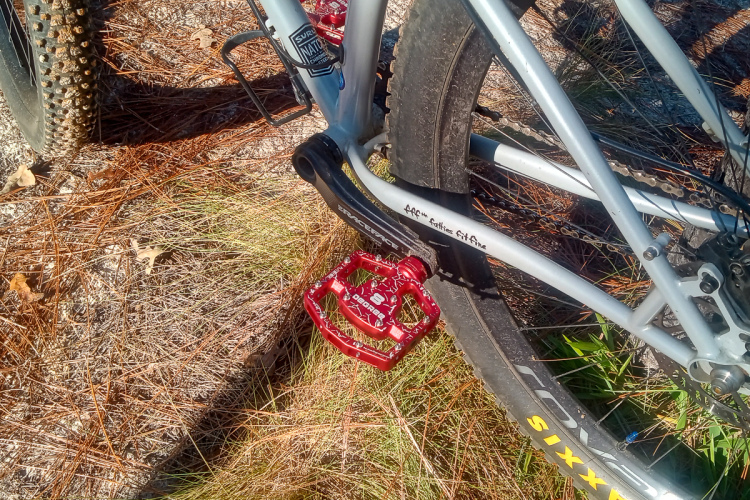
Ten years ago in May of 2012, Will Heiberg knew he had a good idea on his hands. Heiberg and Michael Whitesel visited Ray’s Indoor Bike Park in Ohio and wanted to bring the concept to Portland, a city with countless cyclists, but limited mountain bike options nearby.
“You can’t ride where you want to ride,” says Heiberg. “There’s amazing riding but it’s all an hour away.” When he did escape the city to mountain bike he felt out of practice. Having a “bike gym” where mountain bikers could work out during the week seemed like a natural fit for Portland, not to mention that an indoor venue would keep riders out of the rainy winters.
Slowly but surely, the Lumberyard Indoor Bike Park gained steam after it opened, garnering a spot in the hearts of Portlanders. But, after ten years of building a community-centered gathering place for riders young and old, the Lumberyard will close its doors on Labor Day Weekend this year. Rents have skyrocketed in Portland, along with other costs, and the closures early on in the pandemic were a substantial setback for the business.
More than an indoor bike park

Though the Lumberyard was initially conceived of as a gym for mountain bikers, it turned into more of a school. Younger, school-aged riders flocked to the park, went to after-school programs, and summer school academies. When one kid held a birthday party at the Lumberyard they brought a dozen or so friends, and the park’s visitors grew organically.
Heiberg and Whitesel were an odd couple of sorts, but one that made the park both viable and enjoyable. “Our running joke has always been, if I were to run the park myself, it would be the worlds’ awesomest party and it would last a weekend,” says Heiberg. “If it was Michael’s park, we would have every single penny accounted for but no one would come.”
The Lumberyard also has a more polished demeanor and community-centered atmosphere compared to a public skate park. The park doesn’t tolerate yelling or bad language. If someone crashes, riders rush to help and plop their bikes upside down to block traffic heading toward the fallen rider. The rules didn’t need to be enforced as riders policed themselves.
During summer when the weather is warm and dry, the park runs half-day summer camps for kids aged 3-6 and a full-day summer camp for kids older than 6. Then there are spring break camps, the 10-week After School Shred Academy, and private coaching options.
By 2019, the Lumberyard franchised a pizza place for inside the park and they had already been running a bike repair and retail shop, widening opportunities for revenue. Despite a fire to the building that year, Heiberg and Whitesel felt it was their best yet.
Record scratch
Whitesel and Heiberg tried to keep themselves busy in the first months of the pandemic. The park closed to visitors three different times, so they maintained ramps and jumps and did as much as they could until they could host riders again later in 2020. Mostly it was a lot of “soul searching” says Whitesel.
“It’s hard to blame the pandemic solely, but that definitely set us back and we think we could recover, but it would take us a few years to recover, and then we’re at a point where we’re at the end of a lease and we have to move anyway,” says Whitesel. “It was a rock and a hard place.”
On top of rocketing rents in Portland, Whitesel says the cost for labor, insurance, taxes, and utilities also rose. The Lumberyard spoke with realtors and investors. Buildings with room for them to grow would cost four to five times as much as they are currently paying. If he were to do it again, Whitesel would look at public and private partnership opportunities or other business models. Repeating the process that made the Lumberyard what it was doesn’t seem doable.
“It’s really, really going to be hard for anybody to bootstrap something like this in an urban location where you’ve got to have millions of dollars to secure a property.”
Whitesel and Heiberg are lukewarm to the idea of reopening the Lumberyard in a new location. While the community mourns the coming loss of the park, and people have offered to raise money to help with increased costs, Whitesel says “The story may not be over, but the story for this location is over.”
Looking forward

The two aren’t sure what they’ll do next and are focusing on slowing down operations as positively as possible. Neither of them was excited to tell staff and the community about the closure, but most of the staff has decided to stay until the park closes, and they were flooded with positive comments about the park’s impact.
Spring and summer camps are taking place as usual. Most of the ramps will have to be torn down and recycled since they are site-specific or anchored into the ground, and the features aren’t easily uninstalled and reinstalled.
Whitesel isn’t sure where the odd toolbox of experience he’s grown over the course of the business will land him next.
“How do I build on these skills?” he says. “And what are those skills exactly? Bootstrapping, putting out fires, building an awesome team.”
Heiberg is grateful for the experience and how it has transformed not only his kid’s life but countless others. His two-and-a-half-year-old was the first person to ride the park when it opened in 2012. Now, he’s an instructor at the park, and Heiberg can’t keep up with him on the trail.
“If that was the only thing that I accomplished, this would have been just, success beyond my wildest dreams,” he says. “This has grown way beyond that and I wouldn’t have changed a thing.”











3 Comments
Mar 18, 2022
Mar 21, 2022
Mar 18, 2022